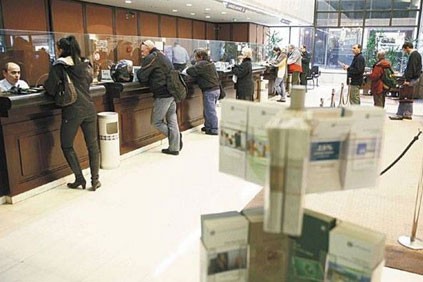Greek capital controls halt exodus after banks lose $48 Billion

Greek bank deposits increased for the time in almost a year as controls on money transfers and withdrawals at cash machines managed to stem a run on the country’s lenders at the expense of a nascent economic recovery.
The stock of money held for businesses and households rose to 121.1 billion euros ($135.3 billion) in August from 120.8 billion euros in July, according to data from the Bank of Greece published on Friday. The modest 300 million-euro increase was the first monthly rise since September 2014.
It still leaves the battered Greek financial system with a net loss of at least 43 billion euros since around the turn of the year as the anti-austerity Syriza party came to power.
After six months of brinkmanship that pushed Greece to the verge of leaving the euro, Prime Minister Alexis Tsipras capitulated to creditors’ demands for more austerity and a new bailout was agreed, but not before he was forced to shut banks and financial markets for as long as a month and impose a limit of 420 euros a week on withdrawals.
Savers have withdrawn more than 116 billion euros since the outbreak of the Greek debt crisis. The latest round of the bank jog that started with Tsipras’s ascent to power left lenders reliant on almost 90 billion euros of Emergency Liquidity Assistance, extended by the Bank of Greece and subject to approval by the European Central Bank.
Lenders will also probably need an additional capital injection this fall, which may be backed by taxpayers after two share capital increases in 2013 and 2014 totaling about 36 billion euros. Tsipras, who won another election on September 20, told his cabinet on Friday that recapitalizing the banking system and lifting capital controls is the new government’s top priority.
The capital controls, put in place on June 28, ban transfers of money abroad without prior approval and documentation as well as curbing cash withdrawals. After emerging from recession earlier this year, economists expect Greece’s economy to show it’s been shrinking again following the disruption to commerce and trade.
[Bloomberg]





